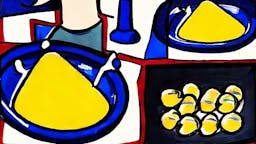Most of us are familiar with the concept of search intent.
You know, is this person:
- Looking for information?
- Searching for a specific website?
- About to make a purchase?
- Researching to buy something later?
Understanding the why enables the creation of content that satisfies their needs, effectively driving traffic to your website. But what about after they’ve reached your site?
The jump from click to conversion usually happens through an even deeper decoding of search intent.
Let’s take the “What’s the difference between Egg Yolks and Egg Whites” example from this case study on Masterclass.
But don’t worry, this isn’t an approach reserved for the industry’s top dogs.
Using the search query above, run down this line of questioning with us. Then you can implement it yourself when developing strategies for clients.
Why this search?
It’s specific and most tools will label this as informational intent. To address this query, you’d probably be inclined to write an article covering everything about egg anatomy. But, do we have the full picture yet?
Why do they want this information?
Here’s where we need to better understand the context. Would a world-class chef be searching for this term? After all, eggs are a pretty basic ingredient. So we can safely assume the skill level of this searcher is either beginner or basic.
Why, yet again?
Now, you’ve got a specific question about eggs and a basic skill level to consider. Let’s think about where they’re at in the journey. Are they thinking about making a dish themselves and looking to do it correctly?
Now we’re collecting insights about skill levels and journeys. It answers the need of the searcher but is also invaluable when figuring out how to better insert ourselves in the picture.
W.W.M.C.D?
If you’re Masterclass examining this search for “What’s the difference between Egg Yolks and Egg Whites”, you write an article about eggs.
Then you add widgets, CTAs, and a downright cinematic trailer. All linking to a course. It’s called Cooking I and it’s taught by Gordon Ramsay! 😈
Masterclass understood the intent, the why, the skill level, and the searchers’ journey behind this term. Then they upped the ante beyond providing a simple answer.
They asked a question of that reader in return: What if you could learn to cook like Gordon Ramsay? A world-class eggsample of connecting the dots from search intent to conversion.
About Kristen Dahlin
Kristen fell into content marketing between Disneyland gigs and Hawaiian weddings. With a few years of SEO-fueled freelance under her belt, she wandered into tech. That winding path eventually landed her as a founding team member of BRIL.LA.

